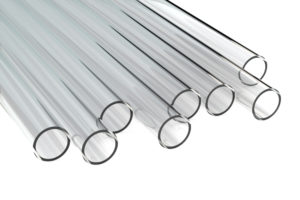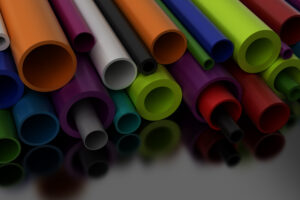 There are certain industries that, no one can argue, are the backbones of everyday life. Without automobiles or food and beverage industries, our day-to-day would be completely unrecognizable. Not to mention the impact of the medical and aerospace industries on the spaces that shape society! In these integral sectors, the importance of them being backed by construction and materials that offer flexibility, durability, and efficiency within the job cannot be overstated. Among these materials, plastic tubing is the throughline that props up a multitude of industries, each harnessing its unique properties to drive advancements and solutions. From medical devices to aerospace components, automotive systems, food and beverage processing, and industrial applications, plastic tubing’s impact is everywhere.
There are certain industries that, no one can argue, are the backbones of everyday life. Without automobiles or food and beverage industries, our day-to-day would be completely unrecognizable. Not to mention the impact of the medical and aerospace industries on the spaces that shape society! In these integral sectors, the importance of them being backed by construction and materials that offer flexibility, durability, and efficiency within the job cannot be overstated. Among these materials, plastic tubing is the throughline that props up a multitude of industries, each harnessing its unique properties to drive advancements and solutions. From medical devices to aerospace components, automotive systems, food and beverage processing, and industrial applications, plastic tubing’s impact is everywhere.
Medical Industry
In the medical field, plastic tubing is pivotal for its non-reactivity, flexibility, and the ability to be sterilized. It finds its use in a variety of applications, including but not limited to, intravenous (IV) lines, catheters, and respiratory tubing. These applications require materials that not only meet stringent health and safety standards but also offer reliability and precision. Plastic tubing facilitates these needs, enabling the delivery of critical medical treatments and fluids to patients, while also supporting innovations in minimally invasive surgery techniques.
Aerospace Industry
The aerospace industry demands materials that can withstand extreme conditions, including high pressure, temperature fluctuations, and chemical exposure, without compromising performance. Plastic tubing rises to this challenge, offering high-performance solutions for fuel lines, hydraulic systems, and ventilation systems in both aircraft and spacecraft. Its lightweight nature contributes to fuel efficiency and cost savings, making it a preferred choice in the design and manufacturing of aerospace components.
Automotive Industry
In the automotive sector, durability and safety are paramount. Plastic tubing is extensively used in this industry for fuel and brake lines, air intake systems, and cooling systems. It offers resistance to corrosion, heat, and wear and tear, thereby extending the lifespan of automotive components. Moreover, its flexibility allows for easier installation and routing within tight spaces, enhancing vehicle design and functionality.
Food and Beverage Industry
Safety, hygiene, and compliance with health regulations are critical in the food and beverage industry. Plastic tubing is utilized for fluid transfer processes, including dispensing systems and beverage lines, offering a non-toxic and taste-neutral solution. It ensures that products are processed, stored, and dispensed safely, maintaining the highest standards of food safety and quality.
Industrial Applications
 The industrial sector encompasses a broad range of applications for plastic tubing, including pneumatic and hydraulic systems, water treatment, and chemical processing. Its chemical resistance, flexibility, and ability to handle a wide range of temperatures make it ideal for conveying gases, liquids, and semi-liquids in industrial settings. Plastic tubing supports operational efficiency, safety, and environmental compliance across various industrial processes. There is a versatile range of plastic tubing options, as well, each made for specific needs.
The industrial sector encompasses a broad range of applications for plastic tubing, including pneumatic and hydraulic systems, water treatment, and chemical processing. Its chemical resistance, flexibility, and ability to handle a wide range of temperatures make it ideal for conveying gases, liquids, and semi-liquids in industrial settings. Plastic tubing supports operational efficiency, safety, and environmental compliance across various industrial processes. There is a versatile range of plastic tubing options, as well, each made for specific needs.
Poly Tubing
- Material: Often refers to polyethylene tubing, which comes in various densities such as low-density polyethylene (LDPE) and high-density polyethylene (HDPE).
- Properties: Resistant to moisture and some chemicals, flexible, and durable. It is widely used for applications requiring fluid and gas transfer. However, its chemical resistance varies depending on the substance, and it might not be suitable for all types of chemicals.
PVC Tubing
- Material: Made from polyvinyl chloride.
- Properties: Offers good flexibility and is known for its strength and durability. PVC tubing is resistant to a wide range of chemicals, including acids, bases, salts, and alcohols, making it a common choice for chemical transfer applications. However, it is not suitable for use with solvents or chemicals that can break down PVC.
Vinyl Tubing
- Note: This is essentially another term for PVC tubing, so it shares the same properties as PVC tubing.
Silicone Tubing
- Material: Made from silicone rubber.
- Properties: Known for its high flexibility, excellent temperature resistance (both hot and cold), and inertness, meaning it does not react with most chemicals. Silicone tubing is especially useful in medical and food applications because it is non-toxic and can be sterilized. It is also used in applications requiring exposure to extreme temperatures.
Metric Nylon Tubing
- Material: Generally refers to nylon tubing that is sized according to the metric system (diameters and wall thicknesses in millimeters).
- Properties: Nylon tubing is known for its excellent strength, flexibility, and resistance to abrasion and many chemicals, including oils and fuels. It’s also known for its good pressure handling capabilities. Ideal for applications requiring precise dimensions in metric measurements, such as in many international markets or specific engineering specifications.
DOT Nylon Tubing
- Material: Nylon tubing that meets the Department of Transportation (DOT) standards, specifically for use in pneumatic brake systems.
- Properties: This tubing is designed to handle high pressures and is resistant to moisture absorption, thermal expansion, and abrasion. It’s used primarily in automotive applications, including air brake lines and fuel lines, where safety and performance standards are strictly regulated.
Polyamide Tubing
- Note: This is essentially another term for Nylon Tubing, so it shares the same properties as Metric and DOT Nylon Tubing.
Kynar Tubing
- Material: Made from Polyvinylidene Fluoride (PVDF), a type of fluoropolymer.
- Properties: Kynar tubing is highly valued for its resistance to chemicals, abrasion, and high temperatures. It also offers excellent purity levels, making it suitable for semiconductor, pharmaceutical, and medical applications. It’s often used in situations requiring exposure to harsh chemicals or environments where other plastics might degrade.
Rigid Plastic Tubing
- Material: Can be made from various plastics, including PVC, Polycarbonate, Acrylic, and others, depending on the application’s requirements.
- Properties: Characterized by its firmness, rigid plastic tubing does not easily bend or flex. It’s used in applications requiring stable, structured conduits, such as in laboratory equipment, structural supports, and fluid transfer systems where shape retention is crucial.
Flexible Plastic Tubing
- Material: Can be made from a range of plastics, such as Polyurethane, Silicone, PVC, and others, tailored to specific needs.
- Properties: As the name suggests, this tubing is designed for flexibility, allowing it to bend and curve without kinking or breaking. It’s ideal for applications requiring movement, such as in medical devices, dynamic machinery, or where installation space is limited.
Each type of tubing brings its own set of advantages to the table, catering to specific industrial, medical, and technical applications based on their unique properties. Whether the need is for durability under high pressure, resistance to harsh chemicals, or flexibility and ease of use, there’s a type of tubing designed to meet those specific requirements.
Custom Plastic Tubing – The Backbone of Numerous Industries
Across this wide range of industries, plastic tubing has solidified itself as a product of choice for its versatility, performance, and contribution to innovation and sustainability. Its adaptability to meet specific industry needs underscores the importance of continuous advancements in plastic extrusion technologies.
Our expertise in developing and manufacturing custom plastic tubing tailored to individual specifications sets us apart in a crowded field. With a vast arsenal of over 300 grades and types of plastic tubing, we not only meet but consistently exceed the highest standards set across various industries.
Our offerings are about precision-engineered solutions designed to address the unique challenges and requirements of our clients. From the critical realms of healthcare, requiring medical tubing, to the stringent demands of chemical processing for chemical-resistant tubing, and onto the broad landscapes of industrial applications, retail, packaging, hardware, and the food and beverage sector, our products are pivotal in powering innovation and efficiency.
Recognizing the diverse needs of these sectors, we provide tubing that can fulfill both NSF (National Sanitation Foundation) and FDA (Food and Drug Administration) requirements, ensuring our products are not only effective but safe for use in sensitive applications like beverage and medical tubing. Our commitment to excellence is reflected in our choice of materials, ranging from flexible options like Polyurethane, Santoprene, FPVC, LDPE, LLDPE, and Nylon 6, to semi-rigid selections such as PP and HDPE, and even rigid varieties like Polycarbonate, RPVC, ABS, high-impact polystyrene (HIPS), and Acrylic.
The cornerstone of our ability to deliver such diverse and high-quality products lies in our proprietary tubing extrusion methods and our mastery over the extrusion of thermoplastic materials. This unique blend of technology and expertise allows us to offer a wide range of customization options. Whether the requirement is for varying degrees of flexibility, resistance to chemicals, or specific temperature handling capabilities, our team at Plastic Extrusion Technologies is equipped to tailor solutions that not just meet, but anticipate and surpass the needs of our clients.
At Plastic Extrusion Technologies, we forge partnerships through our commitment to innovation, quality, and the success of our clients across multiple industries. Our dedication to excellence and our ability to deliver bespoke solutions make us a vital cog in the machinery of progress, powering applications and industries forward into the future.

